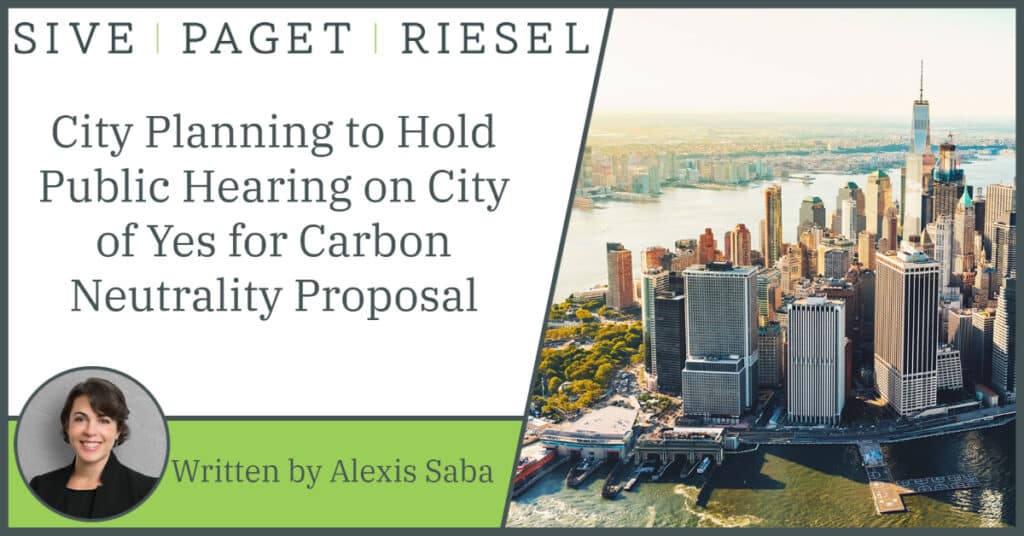Blog

City Planning to Hold Public Hearing on the City of Yes for Carbon Neutrality Proposal
On July 26, 2023, the New York City Planning Commission (CPC) will hold a public hearing on the proposed zoning text amendment known as the City of Yes for Carbon Neutrality (COYCN). The proposed amendment aims to modernize the City’s Zoning Resolution to facilitate renewable energy development, building decarbonization, and electric vehicle (EV) charging deployment. The COYCN supports the City’s climate goals and laws, including Local Law 97 of 2019 (setting building emissions standards), Local Laws 92/94 of 2019 (requiring solar or green roofs on new buildings), and Local Law 154 of 2021 (banning certain fossil fuel use in new buildings). The Department of City Planning has a detailed, user-friendly slide deck on the COYCN available here.
The COYCN proposes significant changes for renewable energy development and battery storage. The current Zoning Resolution incudes complex rooftop solar standards that limit the height and coverage of solar arrays, thereby restricting rooftops’ clean energy-generating capacity. The standards often conflict with Fire Department access needs and with other rooftop uses such as for mechanical systems, which are increasingly housed on roofs, especially as buildings electrify. The COYCN proposes to (1) increase allowable solar height on flat roofs to 15 feet and across 100% of the roof, in zoning districts; and (2) increase allowable solar height on sloped roofs to 60 inches to ensure proper panel orientation and tilt. As for solar canopies, which are effectively prohibited on most parking areas, the COYCN would deem canopies permitted obstructions over all parking areas up to 15 feet high and would change the landscaping provisions to allow larger solar canopies over commercial lots.
The COYCN also proposes to clarify the standards that affect community solar development, which has lagged in residence districts. The amendment would clarify that accessory uses such as solar can serve multiple zoning lots when they are in the same ownership—and would create a new primary use (“energy infrastructure equipment”) for stand-alone solar, wind, and energy storage on sites up to 10,000 square feet in residence districts (or larger with a special permit).
As for battery storage, which is limited in size and by special permit requirements, the COYCN would allow storage systems as primary uses in residence districts on sites up to 10,000square feet, would eliminate system size limits in commercial and manufacturing districts, and would deem storage to be an accessory use if the storage capacity does not exceed 24 hours of the primary use’s peak electrical load.
Complementing these proposed amendments are the proposed changes related to building electrification and energy efficiency, which support new technologies and construction techniques just as owners are retrofitting buildings to comply with Local Law 97. For example, electrified mechanical equipment like heat pumps need sufficient ventilation and a flat surface, making rooftops and yards ideal locations. The COYCN proposes to increase the allowable height and coverage for rooftop equipment and to expand allowances for siting of mechanical equipment in open areas. The COYCN would also revise floor area calculations and deductions to remove barriers to electrical retrofits and advance efficient building envelope replacements and retrofits. Finally, a new special permit would be available for buildings that need additional relief for electrical retrofits.
Finally, the COYCN would expand the allowance for EV charging on private property, as the City Department of Transportation regulates on-street EV charging and the City Department of Buildings regulates EV charging in new parking lots and garages. The current Zoning Resolution considers EV charging stations to be a certain type of commercial use, which means they can only be located in manufacturing districts and limited commercial districts. The COYCN would reclassify the use to allow it in all commercial and manufacturing districts and would clarify that gas stations can host electric charging.
The COYCN is still undergoing review by the Borough Presidents and Community Boards, after which the CPC will review and vote on the proposal, followed by a City Council vote and mayoral review. The COYCN is the first of three City of Yes initiatives, with the Economic Opportunity proposal just getting started after a public information session in June and the Housing Opportunity proposal to begin in 2024.